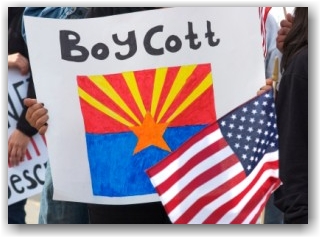Posts Tagged ‘Legal Workforce’
Monday, September 10th, 2012
This employer really crossed the line in continuing to employ unauthorized workers AFTER an ICE audit of their I-9 records commenced, and failed to produce I-9 records for them on 3 previous occasions while transferring them to other jobsite locations.
Here’s the story…. The charges against the owner and Production Manager, Yoel A. Wazana, Wazana Brothers International, Inc., based in Van Nuys, CA, doing business under the name Micro Solutions Enterprises (MSE), are the result of an investigation into MSE’s hiring practices that was initiated by HSI in 2007. According to court documents, shortly after MSE received notification in April 2007 that HSI planned to audit the company’s payroll and hiring records, Wazana directed that about 80 of MSE’s most experienced employees – at least 53 of whom did not have work authorization – be relocated to another manufacturing facility. When investigators requested hiring records from MSE on three separate occasions, the company failed to provide paperwork for those unauthorized workers. The plea agreements filed in this case also describe how, after learning of the ICE audit, Wazana conducted meetings with MSE’s assembly line workers, instructing them to obtain valid work authorization documents and return with those documents, suggesting that he did not care if the documents were actually theirs.
In February 2008, HSI special agents executed a search warrant at MSE’s Van Nuys plant. During the enforcement operation, special agents arrested eight current and former company workers on criminal charges and another 130 employees on administrative immigration violations. The felony charge of false representation of a Social Security number carries a maximum penalty of five years in prison and a $250,000 fine.
MSE has agreed to plead guilty to one misdemeanor count of continuing employment of unauthorized aliens. In a plea agreement filed last month, the firm admits hiring approximately 55 unauthorized workers, and then continuing to employ them after the ICE audit had begun. The company admits that it knew, or deliberately avoided knowledge of the fact, that the individuals were not authorized to work in the United States.
The company’s plea agreement represents a global settlement of criminal and civil charges against the firm. Under the terms of the plea agreement negotiated by ICE and the United States Attorney’s Office, MSE agreed to pay approximately $267,000 in civil and criminal fines.
Beyond the monetary sanctions, the plea agreement calls for the company to be on probation for three years, during which time it will implement a series of stringent measures to ensure it is complying with the nation’s hiring laws. Those steps include retaining an independent compliance monitor (this is the first time we’ve heard of an ‘independent compliance monitor’ being mentioned) to oversee the completion and maintenance of the firm’s hiring records, and providing training to employees regarding federal hiring laws. The plea agreement takes into account the company’s willingness to take responsibility for its prior criminal conduct and to implement a rigorous program to ensure full compliance with federal hiring laws in the future.
In 2009, HSI implemented a new, comprehensive strategy to reduce the demand for illegal employment and protect employment opportunities for the nation’s lawful workforce. Under this strategy, HSI is focusing its resources on the auditing and investigation of employers suspected of cultivating illegal workplaces by knowingly employing illegal workers. In the last year, HSI has levied a record number of civil and criminal penalties against employers who violate immigration laws.
An employer’s blatant disregard for employment-related immigration law has been proven time and time again in our blog reporting of these cases to be an expensive, painful, reputation damaging and unnecessary path. Call our office to establish a compliant workforce, 562 612.3996.
Tags: Continuing to Employ Unauthorized Aliens, DACA, HSI, I-9 AUDIT, I-9/E-Verify News, ICE, ICE Audit, ICE Penalties, ICE Violations, Immigration Reform, Legal Workforce, Micro Solutions Enterprises, MSE, Unauthorized Employment, Undocumented Workers, Yoel Wazana
Posted in Comprehensive Immigration Reform, DACA | DAPA, Department Of Homeland Security (DHS), Employer Compliance, I-9/E-Verify News, ICE, Immigration News | Comments Off on I-9/E-Verify News: Criminal Charges in HSI Probe for Hiring Violations Coverup
Friday, September 7th, 2012
The Department of Homeland Security issued an update today that the Department of Homeland Security (DHS) is working to resolve this issue and will have a fix on September 14, 2012.
:::::::::::::::::::::::::::::
Without any advance notice, the CBP has made changes that affect the I-9 form by no longer issuing paper I-94 cards and no longer stamping I-20 forms for F and M student visas, or form DS-2019 Certificate of Eligibility for Exchange Visitors and Foreign Students, affecting both J and F visa holders.
Customs and Border Protection is in the process of automating traveler arrival records (I-94 cards) to streamline passenger processing. The current processing time for entering foreign visitors’ travel information into the I-94 database is 30 days or more. This does not affect the majority of foreign travelers visiting for business or leisure and will not affect any visitor’s record of departure. But it will greatly influence how you document Section 2 of the I-9 form for the nonimmigrant employee that produces a List A foreign passport with an I-94 entry card.
PLEASE NOTE: With the newly proposed 2-page I-9 form, no guidance has as yet been provided regarding the I-94 card as an acceptable List A document in concert with a foreign passport. We will keep you posted concerning these changes as soon as we receive new guidance. In the meantime, we recommend that you print out this information and attach it to any new employee’s I-9 form who would normally produce an I-94 record (but doesn’t have one and is waiting to access an electronic version) along with a foreign passport as a List A document.
CBP has suggested the following: Nomiggrants may need to prove their legal-visitor status within the first 30-45 days of their U.S. stay to:
Employers;
Motor vehicle registration or drivers’ licensing agencies;
The Social Security Administration;
U.S. Citizenship and Immigration Services; or
Universities and schools.
If during this timeframe, visitors need to provide evidence of legal status they should include the following:
Unexpired foreign passport; and
Country of Citizenship
CBP Arrival/Departure Record, Form I-94 (if issued)
Contact CBP for more information or with questions.
Tel: (877) CBP-5511
TTD: (866) 880-6582
If a state benefit granting agency rejects an unstamped Form I-20/DS-2019, applicants may make an appointment with USCIS online through InfoPass and take their Form I-20/DS-2019 to their local USCIS office to be stamped. ( InfoPass ) This transitional step will end on Nov. 21, 2012.
International students and scholars who encounter issues with their state or federal benefit applications should continue to contact the Immigration and Customs Enforcement Student and Exchange Visitor Program (SEVP) at (703) 603-3400 or SEVP@dhs.gov.
Please feel free to contact our office should you have questions concerning these changes, 562 612.3996 or email info@immigrationcompliancegroup.com
Tags: CBP, DS-2019 form, Electronic I-94 card, F Visa, I-9 Form, I-9/E-Verify News, I-94 Card, ICE, Immigration News, J Visa, Legal Workforce, M Visa, New I-9 Form, Student Visas, USCIS
Posted in Customs & Border Protection(CBP), Employer Compliance, I-9/E-Verify News, ICE, Immigration Legislation, Immigration News, USCIS | Comments Off on Update: CBP Makes Changes Affecting I-9 Form, F, M and J Visa Stamping
Monday, September 3rd, 2012
By: Timothy Sutton, Communications Editor
 Today, recruiters, human resource managers, and small business owners utilize the Internet to recruit new employees. Online recruiting is cheap, efficient, and reaches a much broader audience than traditional forms of media. While there are numerous advantages to employing a professional staffing agency to locate prospective employees through the Internet, many employers choose to self-publish want ads through popular websites like monster.com or craiglist.org. Self-publishing online job posting gives the employer complete control over when, where, and how long a post will be visible to the public. Ultimately, do-it-yourself recruiting can be personally tailored to suit a particular employer’s needs.
Today, recruiters, human resource managers, and small business owners utilize the Internet to recruit new employees. Online recruiting is cheap, efficient, and reaches a much broader audience than traditional forms of media. While there are numerous advantages to employing a professional staffing agency to locate prospective employees through the Internet, many employers choose to self-publish want ads through popular websites like monster.com or craiglist.org. Self-publishing online job posting gives the employer complete control over when, where, and how long a post will be visible to the public. Ultimately, do-it-yourself recruiting can be personally tailored to suit a particular employer’s needs.
But recruiters beware. The Internet is much more sophisticated than a virtual corkboard. Keywords and phrases in your job listings can be tracked and monitored by government software, then stored in databases. Recently, the Civil Rights Division of the Office of Special Counsel (OSC) released a Best Practices notice for online job posting. Whether this notice foreshadows future litigation over civil rights violations in hiring practices is yet to be determined; regardless, the message is clear, employers need to exercise caution when recruiting online because the OSC is monitoring online want ads.
Immigration laws prohibit the use of discriminatory language regarding U.S. Citizenship, lawful permanent residence, citizenship status, or national origin unless required by law, regulation or executive order. Curiously, the OSC notice was released shortly after a handful of states attempted to curtail the rights of Deferred Action Childhood Arrival qualifiers to obtain state identification (see our previous post here). There is no data revealing any increase in discriminatory language found in online job postings, but a simple keyword search on either monster.com or craigslist.org reveals numerous non-compliant ads. For instance, if the word “citizen” is entered into Craigslist, ads for dishwashers, personal assistants, security guards, and caregivers pop up. Each ad contains some version of the following discriminatory language that the OSC notice clearly forbids pursuant to the Immigration and Nationality Act at § 1324b that prohibits discrimination based on the citizenship status or national origin in the hiring, firing unfair document practices (“document abuse”) during employment eligibility verification process, and retaliation:
- “Only U.S. Citizens”
- “Citizenship requirement”*
- “Only U.S. Citizens or Green Card Holders”
- “H-1Bs Only”
- “Must have a U.S. Passport”
- “Must have a green card”
One explanation presented by the OSC for the common use of such language is the misinterpretation of federal employment laws. Employers are not limited to the recruitment of U.S. citizens. In fact, we recently published an article on the proper method of verifying the legal employment status of refugee/asylees. Due to the complexity of adhering to the legal requirements of recruiting, hiring, and employing individuals in today’s diverse workplace, employers should seek the professional guidance of an attorney. The cost savings and convenience of self-publishing job postings are heavily outweighed by the potential financial penalties and negative publicity of losing an anti-discrimination lawsuit.
Our office has the experience and successful track record necessary to protect the interests of your enterprise. For more information, contact one of our immigration professionals at info@immigrationcompliancegroup.com or call 562 612.3996.
Tags: Anti-Discrimination, Anti-Discrimination Lawsuits, Civil Rights Violations, Discriminatory Language, Employer Comopliance Training, HR Professionals, I-9 Form, I-9/E-Verify News, Immigraiton News, Immigration Compliance Group, Internet Recruitment, Legal Workforce, OSC, OSC Best Practices for Job Posting, Recruiters, Recruitment Discrimination, Staffing Agencies, Talent Acquisition, Unfair Employment Practices
Posted in DACA | DAPA, Employer Compliance, I-9/E-Verify News, ICE, Immigration News, OSC, Staffing Agencies | Comments Off on RECRUITING: Internet Justice – Respecting Civil Rights in Online Recruiting
Monday, August 20th, 2012

By: Timothy Sutton, Communications Editor
The State of Arizona behind Governor Jan Brewer has made their position clear, they do not support Deferred Action Childhood Arrivals. Brewer signed her own executive order to “defend” Arizona from President Obama’s Deferred Action Program. Executive Order 2012-06 alleges that because DACA workers are not given lawful status, but merely deferred status, DACA recipients can be legally denied the right to obtain a driver’s license or any public benefit.
Brewer justifies her executive order as a defense against DACA which she refers to as “federal paperwork,” that will result in “significant and lasting impacts on the Arizona budget, it’s healthcare system and additional public benefits that Arizona taxpayers fund.” A Brewer spokesperson sited specific public benefits that DACA holders will not be eligible for: KidsCare, a children’s health-insurance program; unemployment benefits; business and professional licenses and government contracts.
Legal challenges to Brewer opposition of Obama’s DACA program are expected this week. Under the REAL ID Act of 2005 Sec.202(C)(B)(2)(viii), a federal law that modified requirements for state driver’s licenses and ID cards, “deferred action” is a term used for those eligible for state issued identification and driver’s licenses. According to NBC News, Regina Jefferies a local Phoenix attorney, criticized Brewer’s executive order saying, “Immigrants in Arizona have in the past been granted “deferred action” for other reasons long before the new Childhood Arrivals program was announced.” Additionally, Brewer’s spokesperson said that DACA students would not receive in-state tuition pricing.
After Brewer’s announcement, protester’s outside of the Arizona state capital waived signs that read, “Why the hate?” This sentiment raises the question, is Brewer guilty of playing politics with immigrant lives? Certainly, extreme curtailing of the DACA program by states like Arizona (and Florida) appears to be less about state preservation than politics. This preemptive strike against the Presidential Executive Order is a sign of the strong resistance to come for future immigration reform that favors inclusion over deportation.
California officials announced they would honor the DACA program and issue driver’s licenses to eligible persons. As temporary California residents, DACA beneficiaries will be afforded in-state tuition pricing, driver’s licenses, and the temporary ability to seek employment.
The national success of the DACA program shall remain closely monitored. We will continue to keep you updated on this and other breaking immigration news. If your business has questions about the DACA program or hiring from this temporary workforce, contact one of our immigration professionals at info@immigrationcompliancegroup.com or call 562 612.3996.
Please check out our news and stay informed.
More articles: AZ Denies Dreamers GED Classes
Driver’s Licenses Vary by State
Tags: Arizona Immigration, AZ Gov. Jan Brewer, Comprehensive Immigraiton Reform, DACA Program, Deferred Action for Childhood Arrivals, Dreamers, illegal immigrants, Immigration Reform, Legal Workforce, President Obama Executive Order, Undocumented Workers
Posted in DACA | DAPA, Employer Compliance, ICE, Immigration Legislation, Immigration News | Comments Off on Brewer v. Obama: AZ Won’t Issue Driver’s License To DACA Workers
Sunday, August 12th, 2012
By: Timothy Sutton, Communications Editor
On August 10, 2012, the 3rd Circuit Court of Appeals ruled in favor of Wal-Mart Stores Inc., facing charges for acts of transporting illegal immigrants, harboring illegal immigrants, encouraging illegal immigration, conspiracy to commit money laundering, and involuntary servitude. Zavala et al. v. Wal-Mart Stores Inc., spanned eight years and four judicial opinions. The allegations against Wal-Mart suggested that senior officials knowingly and willingly permitted contractors and sub-contractor to hire illegal immigrants to perform after-hour janitorial services.
In their defense, Wal-Mart asserted that the plaintiff janitorial workers were not employees (therefore, not under their control), but also performed work at a Marriott hotel, a movie theater, and remodeling homes. Further, Wal–Mart often used store associates (regular, non-contract employees) to clean its stores. As a result, the court found that Wal-Mart did not knowingly hire illegal immigrant workers or encourage their contractors to do so. The court refused to certifying the class action based upon the shared discrete characteristic of plaintiffs as undocumented immigrants, stating: “Being similarly situated does not mean simply sharing a common status, like being an illegal immigrant.”
Moving forward, it is likely that Wal-Mart will amend its screening and compliance policies when hiring contractual workers. Many of the allegations against the big-box retailer reveal suspect employment practices that should be avoided including:
- Management commenting on immigration status of workers
- Using out-of-state relief workers immediately following the arrest of workers by federal immigration authorities
- Allowing workers to store personal belongings in store
- Allowing workers to sleep in store
For more information about the latest immigration court rulings and other breaking immigration news, subscribe to our blog and contact our office to discuss your I-9 audits, training and compliance program needs, 562 612.3996, info@immigrationcompliancegroup.com.
Tags: Employer Compliance I-9/E-Verify, ICE, illegal immigrants, Legal Workforce, Undocumented Workers, Walmart Janitor Contractors, Walmart Janitorial Class Action
Posted in Employer Compliance, I-9/E-Verify News, ICE, Immigration News | Comments Off on Squeaky Clean? Wal-Mart Escapes Janitorial Class Action | Immigration Compliance Group News
Tuesday, August 7th, 2012
By: Timothy Sutton, Communications Editor
 The United States Citizenship and Immigration Services (USCIS) have released a brochure, flyer, information on avoiding scams and hosted a teleconference regarding the launch date of the Deferred Action Childhood Arrivals (DACA) Application effective August 15, 2012. USCIS has provided a wealth of detailed information in various forms to clarify the deferred action application procedures. The popular media format of the flyer will likely be the most effective educational tool used with those eligible for the program. The timeline format and accompanying info-graphics are matched with concise language that aid the reader’s understanding.
The United States Citizenship and Immigration Services (USCIS) have released a brochure, flyer, information on avoiding scams and hosted a teleconference regarding the launch date of the Deferred Action Childhood Arrivals (DACA) Application effective August 15, 2012. USCIS has provided a wealth of detailed information in various forms to clarify the deferred action application procedures. The popular media format of the flyer will likely be the most effective educational tool used with those eligible for the program. The timeline format and accompanying info-graphics are matched with concise language that aid the reader’s understanding.
Below are some highlights of the latest updates to the application procedure shared by USCIS Director Mayorkas on Friday, August 3, 2012:
Requesting Deferred Action
The government filing fees will be $465 in total for the deferred action application, the employment authorization document and the biometrics/background check.
Director Mayorkas stated that the information provided to USCIS on a request for Deferred Action (DAC)A request is protected from disclosure to U.S. Immigration and Customs Enforcement (ICE) and U.S. Customs and Border Protection (CBP) for the purpose of immigration enforcement proceedings unless the requestor meets the criteria set forth in USCIS’s Notice to Appear guidance (
www.uscis.gov/NTA). Individuals whose cases are deferred pursuant to the consideration of deferred action for childhood arrivals process will not be referred to ICE. The information may be shared with national security and law enforcement agencies, including ICE and CBP, for purposes other than removal, including for assistance in the consideration of deferred action for childhood arrivals, to identify or prevent fraudulent claims, for national security purposes, or for the investigation or prosecution of a criminal offense. The above information sharing policy covers family members and guardians, in addition to the requestor.
There is no reapplication or appeals process for a failed application.
Biographic and biometric background checks are required. Immigration crimes are not factored into criminal history.
At this time, extensions of the 2 year deferred action status will be available.
Unlawful presence status is put on hold once deferred action status is granted.
If denied, cases will only be referred to removal proceedings under exceptional circumstances.
Qualifying For Deferred Action
- Individuals must not have current immigration status.
- Individuals detained by USCIS may only request qualification through their detention officer.
What documents will be required? Financial, medical, school, employment, and military records sufficient to show both entry before age of 16, as well as residence for at least five years preceding June 15, 2012. Affidavits alone will generally not be sufficient evidence, but may support a shortcoming in documentation regarding casual departures or continuous residence. USCIS will not accept affidavits in support of meeting the below requirements. You may request consideration of deferred action for childhood arrivals if you:
- Were under the age of 31 as of June 15, 2012;
- Came to the United States before reaching your 16th birthday;
- Have continuously resided in the United States since June 15, 2007, up to the present time;
- Were physically present in the United States on June 15, 2012, and at the time of making your request for consideration of deferred action with USCIS;
- Entered without inspection before June 15, 2012, or your lawful immigration status expired as of June 15, 2012;
- Are currently in school, have graduated or obtained a certificate of completion from high school, have obtained a general education development (GED) certificate, or are an honorably discharged veteran of the Coast Guard or Armed Forces of the United States; and
- Have not been convicted of a felony, significant misdemeanor, three or more other misdemeanors, and do not otherwise pose a threat to national security or public safety. Driving under the influence is considered a significant misdemeanor.
- Note: *Circumstantial evidence will not be considered for age on June 15, 2012 or school/veteran status.
- Travel prior to August 15, 2012 must be brief, casual, and innocent in nature.
- If false or misrepresented information appears on the application, unlawful status is upgraded to enforcement priority, subject to immediate criminal prosecution and removal.
- There is no expedited processing for deferred action.
- Employment authorization requires demonstration of “an economic necessity for employment.”
- Relatives are not covered under deferred action unless they independently qualify
- TRAVEL: Question – If my case is deferred pursuant to the consideration of deferred action for childhood arrivals process, will I be able to travel outside of the United States? Not automatically. If USCIS has decided to defer action in your case and you want to travel outside the United States, you must apply for advance parole by filing a Form I-131, Application for Travel Document and paying the applicable fee ($360). USCIS will determine whether your purpose for international travel is justifiable based on the circumstances you describe in your request. Generally, USCIS will only grant advance parole if you are traveling for humanitarian purposes, educational purposes, or employment purposes. You may not apply for advance parole unless and until USCIS defers action in your case pursuant to the consideration of deferred action for childhood arrivals process. You cannot apply for advance parole at the same time as you submit your request for consideration of deferred action for childhood arrivals. All advance parole requests will be considered on a case-by-case basis.
Subscribe to our blog for breaking news and updates on deferred action and other immigration laws. We are starting to work with clients on documentation gathering. Should you have questions or wish to engage the services of our office, please contact us at 562 612.3996 or email us at: info@immigrationcompliancegroup.com
Resources: The USCIS “How do I Guide” – USCIS FAQs
Tags: Deferred Action Childhood Arrivals, Deferred Action Effective date 08/15/2012, EAD Card, Employment Authorization, Immigration Detention, Immigration Reform, Legal Workforce, Prosecutorial Discretion, Removal Proceedings, USCIS, Voluntary Departure
Posted in Comprehensive Immigration Reform, DACA | DAPA, Immigration Legislation, Immigration News, USCIS | Comments Off on “D.A. Day” 08/15/12: Deferred Action Ready For Launch | Update from Immigration Compliance Group
Friday, August 3rd, 2012
 By: Timothy Sutton, Communications Editor
By: Timothy Sutton, Communications Editor
Shortly after ICE began their Form I-9 audit of the San Antonio based sushi chain, Sushi Zushi, an exodus of employees forced the company into a weeklong-statewide shutdown. After an internal announcement by Sushi Zushi management to employees of the routine audit, a wave of scared employees did not return to their jobs on Friday Morning. A public statement was issued by Sushi Zushi’s public relations spokesperson; Judy McCarter detailing the company’s decision:
STATEMENT FROM SUSHI ZUSHI, Friday, July 27, 2012
Sushi Zushi has temporarily suspended its operations and closed its restaurants in San Antonio, Austin and the DFW Metroplex. We plan to resume operations as soon as possible.
The decision to close the restaurants was made at Sushi Zushi today by executive management due to an unanticipated internal reaction to news of a routine I-9 audit. Several vital employees have chosen not to report to work. This has affected our ability to provide our expected level of service to guests. CEO Alfonso Tomita is returning from travels outside the country.
Sushi Zushi’s policy is to comply with all federal, state and local laws and regulations. And Sushi Zushi has made its best efforts to comply with I-9 requirements always done appropriate due diligence on all its staff. Sushi Zushi is working with legal counsel to respond to the government’s audit.
We wish to be clear – there was no raid by the government on our operations. Nor has any employee been detained by the government or terminated by the company. Sushi Zushi is responding to a routine I-9 audit. We apologize in advance for the inconvenience and appreciate the patience of our loyal guests while we work through this issue.
Company management immediately posted want ad’s on Craigslist and Facebook. Their customers posted their concerns across social media, including accusations of mismanagement that surfaced on reddit.com. In the midst of this audit meltdown, an employee announced via facebook that he was promoted from delivery driver to sushi chef. With the company’s reputation spinning out of control, their facebook page had posts of former kitchen employees who remarked, “The food won’t be the same without us,” while other employees joked with friends that they had a week-off work to “fill out their I-9 forms.”
Before ICE issues a dollar of fines or fees, Sushi Zushi will suffer hundreds of thousands in loses and devastating harm to their reputation. Sushi Zushi employees fled because they were not educated on the differences between an I-9 audit and deportation raids. Clearly, today’s ICE audits are shaping up to be equally as effective in deterring unlawful employment as raids of the past. To prevent your company from becoming the next Sushi Zushi, contact our immigration professionals for their expert knowledge on Form I-9 compliance, and sign up to receive our information and visit our Employer Resource Center: www.I-9Audits.com
Tags: I-9 AUDIT, I-9 Fines, I-9 management, I-9 Training, I-9/E-Verify News, ICE Audit, Legal Workforce, Sushi Zushi Audit, Undocumented Workers, Worksite Enforcement
Posted in I-9/E-Verify News, ICE, Immigration News, USCIS | Comments Off on Form I-9 Audit Prompts Sushi Zushi Closure – Fish on ICE
Sunday, July 29th, 2012
 By: Timothy Sutton, Communications Editor
By: Timothy Sutton, Communications Editor
Wait Wait… Don’t Tell Me! is a comedic quiz program on NPR, testing listener’s knowledge of current events against some of the best and brightest in the news world. While figuring out what’s real news versus what’s made up, the show’s host presents a scenario to the contestant to determine if the scenario is fact or fiction. If you weren’t tuned into C-SPAN, you may have legitimately mistaken the House oversight committee’s interview, of the Secretary of the Department of Homeland Security (DHS) Janet Napolitano, as the latest episode of Wait Wait.
In this episode, members of the Congressional oversight committee rapidly fired questions at Napolitano, cutting short her responses, attempting to validate their “real news,” as something more than “made up.” The result, a trial like inquisition reminiscent of the famous scene between Tom Cruise and Jack Nicholson from A Few Good Men, with Napolitano ceremoniously remarking “you can’t handle the truth!” In reality, with grace and imperturbable resolve, Napolitano slowly roasted over the House Committee’s rotisserie.
Attacks upon the DHS Secretary by Chairman Lamar Smith (R-TX), Sensenbrenner (R-WI), Conyers (D-MI), and many more; indicated summary judgment has been rendered against the DHS for their approach to immigration enforcement, particularly in the areas of: visa overstays, boarder security, and deferred action. The business community should take note; Napolitano’s significant immigration reforms have yet to satisfy Congressional discontent. Looking forward, expect tighter regulation of business immigration under the guise of immigration overhaul.
Here are some DHS immigration reform highlights Napolitano submitted to Congress:
- Current DHS immigration reform focuses resources on repeat immigration law violators
- Numerous improvements were made to welcome business people…staying true to our history as a nation of immigrants
- Deterring Employment of Aliens not authorized to work by:
- Eliminating high-profile raids and focusing on compliance through criminal prosecution of egregious employer violators, Form I-9 inspections, civil fines, and debarment
- Since 2009, ICE audited more the 8,079 employers, debarred 726 companies, and imposed $87.9 million in financial sanctions
- Educated the business population through instituting:
- E-Verify with more than 385,000 participants
- E-Verify self-check
- Improving Legal Immigration:
- Streamlining path for EB-5 entrepreneurs and clarifying the EB-2 classification
- Instituted Entrepreneurs in Residence program and proposed regulatory changes in the Federal Register in April 2012 to minimize delays of family based immigration petitions
- Reduced processing of benefit requests through Electronic Immigration System of Registration (ELIS)
- Implemented “Study in the States” initiative to attract international students through a streamlined visa process
- Comprehensive Immigration Reform:
- Supporting the Supreme Court’s decision on Section 2(B) of S.B. 1070
Napolitano capped off her remarks on immigration stating, “only a nationwide solution will resolve the challenges posed by the current immigration system.”
Despite the Congress clearly conveying their message to DHS, “Wait wait, don’t tell me, you think you’re doing a good job…” Napolitano’s focus on streamlining existing immigration policies is positive news for US businesses. Until the promise of streamlining comes to fruition, removing your business from the auditing radar, enrolling in E-Verify, and becoming Form I-9 compliant remain immigration best practices.
If you can handle the truth about current immigration policies, subscribe to our blog and stay informed by checking out our I-9 Employer Resource Center and join our LinkedIn Group.
Tags: Comprehensive Immigration Reform, Deferred Action, Department Of Homeland Security (DHS), DHS Secretary Napolitano, E-Verify, E-Verify Self Check, EB-5 Investor Visa, Entrepreneurs in Residence, form I-9, I-9/E-Verify News, ICE, ICE investigations, Legal Workforce, Napolitano's Congressional Testimony, Study in the States, US Immigration Policy
Posted in Comprehensive Immigration Reform, Congress, Department Of Homeland Security (DHS), I-9/E-Verify News, ICE, Immigration Legislation, USCIS | Comments Off on DHS Secretary Roasted By Congressional Committee | Immigration Compliance Group News
Saturday, July 21st, 2012
By: Timothy Sutton, Communications Editor
Swiss based Nestle has discovered “numerous” violations of its internal work rules as a result of internal auditing aimed at combatting child labor. The manufacturer of Kit-Kat bars reported that four-fifths of its cocoa comes from unmonitored labor channels. The Fair Labor Association is insisting Nestle implement higher supply chain standards moving forward. The cocoa industry is fraught with child labor issues, with child worker rates reaching upwards of 89% in the Ivory Coast. Unfortunately this far-reaching problem will not be solved overnight, “The complexity of child labor in the cocoa supply chain means solving the problem will take years,” Nestle said.
As a result of Nestle’s voluntary audit, the company has avoided penalties thus far. However, their involvement in child labor comes at a price. The company is now committed to altering supply chain practices and will invest heavily in future monitoring services.
While most American businesses can rest assured they are not supporting the underground child-labor industry, Nestle’s efforts to self-assess and reform should be applauded. Domestic and international companies will benefit greatly from routine internal audits that track workforce compliance. USCIS and ICE encourage employers to frequently perform internal audits of their Form I-9 practices. In fact, records of regular auditing of your workforce may help you avoid hefty civil penalties in the event of an official government audit. The next time you “break off a piece of that Kit-Kat bar,” consider following Nestle’s example of self-auditing and contact one of our immigration professionals at info@immigrationcompliancegroup.com or call 562 612.3996.
Other resources:
Tags: Child Labor Laws, E-Verify, Fair Labor Association, I-9 Audits, I-9 Compliance, I-9 Training, I-9/E-Verify News, Legal Workforce, Nestle, Voluntary Audits, Worksite Enforcement
Posted in Department Of Homeland Security (DHS), I-9/E-Verify News, ICE, Immigration News | Comments Off on Nestle KID-Kat Bars?: Audit Helps Chocolate Maker “Grow Up”
Wednesday, July 18th, 2012
 By: Timothy Sutton, Communications Editor
By: Timothy Sutton, Communications Editor
In an effort to assist participating employers comply with the user requirements of E-Verify and to help improve participants’ overall use of the program, USCIS issued two self-assessment guides in June. Both guides are substantively similar, but are procedurally designed to assist two sets of users, either web-access or direct access users. Voluntary E-Verify participants will benefit from this recent assistance publication by following the eight-part checklist provided therein.
The self-assessment checklist covers, post-enrollment activities, creation of cases, photo matching, tentative nonconfirmation, DHS referral, SSA referral, final case resolution, and final case closure statements. USCIS touts E-Verify as an easy-to-use online tool, but warns, “Employers may be subject to legal action for some types of E-Verify misuse.” The self-assessment guide highlights below may surprise current E-Verify users who may unwittingly be noncompliant:
Monitored Activities Common Mistakes:
- Duplicate cases for same employee
- Verifying employees hired before 11/7/86
- Immediately terminating employee who receive a tentative nonconfirmation (TNC)
- Failing to create a case by the third day after employee started work for pay
- Creating cases for employees hired before E-Verify participant enrollment
Post-Enrollment Activities: Do web services comply with interface control agreements?
Creation of Cases: Is all personally identifiable information safeguarded at all times, with only minimal information retained?
Photo Matching: Are document photos matched to the photo on E-Verify rather than to the employee?
Tentative Nonconfirmation: Do case closure statements notify DHS if an employee who receives a TNC chooses not to contest is not terminated?
DHS & SSA Referral: Do E-Verify participants and employees both sign the English-language version of the referral letter?
Final Case Resolution: Upon receipt of a “DHS No Show” message, does the employee contact DHS within the required time?
Final Case Closure: Does the user file completed Form I-9 and all attachments in a secured location?
Although the self-assessment is a valuable tool to assist employers with E-Verify compliance, the checklists do not render a company audit proof. For assistance implementing best practices for E-Verify and other immigration related topics contact one of our immigration professionals.
Want to stay informed:? Check out our I-9 Employer Resource Center and join our LinkedIn Group
Tags: DHS Referal, E-Verify Case Resolution, E-Verify Direct Access Guide, E-Verify Self-Assessment Guide, E-Verify Web Service Guide, I-9 Form, I-9/E-Verify News, Immigration News, Legal Workforce, Photo Matching, SSA Referral, TNC, USCIS
Posted in I-9/E-Verify News, ICE, Immigration News, USCIS | Comments Off on E-Verify Self-Assessment Guides: A Good Tool but does not render Employer Audit Proof






